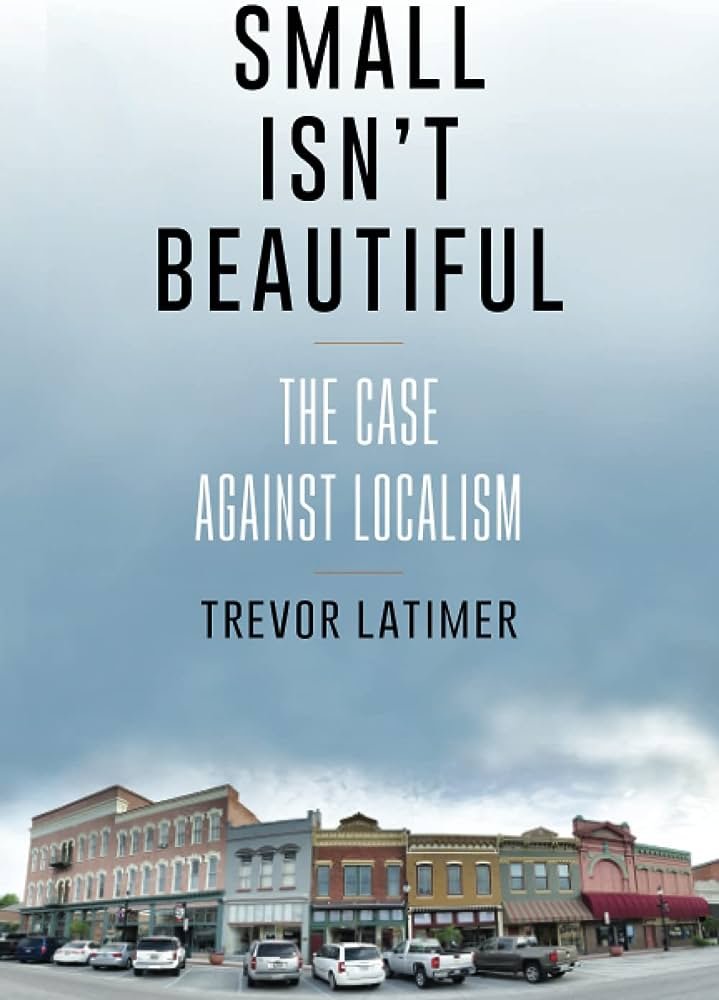
What Court Mergers Teach Us About Cutting Government Costs
Across the world, consolidation is a common way of reforming local government. Advocates argue that combining two or more local governments enables the new, larger government to reduce spending by providing services more efficiently. One way that mergers achieve this is by spreading large capital costs over a larger population: instead of two small towns operating their own trash removal service or two small school districts running two administrative systems, the larger local government can operate one. It is also argued that mergers can reduce spending through the elimination of redundant departments, services, and staff.

Resettled Refugees and African Americans in the Same Neighborhoods
Our study delves into the relationship between resettled refugees and native Black Americans who share neighborhoods but may experience distinct realities. We aim to understand if refugees and native Blacks perceive their surroundings similarly; if they interact; and whether they view each other as strangers, threats, or potential allies for collective problem-solving. Our investigation focuses on intergroup dynamics and local power relations between "old locals" (incumbent residents) and "new locals" (resettled refugees) to assess opportunities for community building between these historically minoritized multiethnic groups.

Analog alternatives to the urban platform
In our final installment of this four-part cities on cities and technology, we wrap up our conversations on smart cities, urban platforms, knowledge production, and civic intelligence by exploring alternative approaches to urban transformation – analog and digital. Tune in to learn more about the Anti-Eviction Mapping Project, the changing geography of carbon economies, and what post offices and hardware stores can teach us about community.

With a little help from my friends?
Cities around the world face declining revenues and increasing demands for public services by residents and commuters. Large metropolises have been navigating times of deficit for a long time. The pandemic only intensified these dynamics, particularly in big cities. Cross-boundary dynamics, such as contracting out or joint production of services, are well-known practices intended to (a) lower the costs of services, (b) increase service quality, and/or (c) enable access to certain services.

Urban Platforms: Uploading the City
Part three of our four-part series on cities and technology attempts to grapple with the urban platform, platform urbanism, and the messy consequences of implementing these approaches in cities. Is a city like a platform, or is it a platform? What kinds of data do urban platforms need to operate, and what kinds of subjects do those data make? This episode features excerpts from all six scholars in the series who untangle these threads and challenge the assumptions of tech-driven policies.

‘Anywhere but Here’
Homelessness is a pressing issue in many communities across the United States, with California often at the epicenter of the crisis. Despite numerous policy initiatives aimed at its alleviation, for six straight years, the problem has increased nationwide. Areas where we had seen improvement, such as veteran and family homelessness, are again on the rise. Meanwhile, racial disparities in homelessness are at an all-time high, with communities of color experiencing the phenomenon at three to four times the percentage of their overall representation in the population.

How smart is the Smart City?
In part two of this four-part series on cities and technology, we turned our attention to smart cities. This concept gained some traction over the last decade as a technocratic solution to urban problems. Through the use of open data, widespread surveillance systems, and various digital data-generating tools, the smart city promised an apolitical suite of practices that could improve and optimize city governance and life. But as we learned in Part One, nothing about technology is politically neutral. We speak with four different scholars on their work in the smart cities arena and how it intersects with postcolonial critique, economic development, and the politics of open data.

Open Peer Review at UAR
Urban Affairs Review is pleased to announce a new open peer review pilot program! If your article is accepted for publication following our double-blind review process, you will have the opportunity, if you choose, for your peer reviewers to revise and publish their original comments and responses to your article, as a stand-alone commentary (maximum 2,000 words) once the central article is published. You as the author(s) will also have an opportunity to respond to reviewers’ comments in a stand-alone response essay (maximum 2,000 words).

From the Local to the Hyperlocal
Mark Chou (Austrialian Catholic University) reviews “Small Isn’t Beautiful: The Case Against Localism” and “Hyperlocal: Place Governance in a Fragmented World” in this book review essay.

What We Talk About When We Talk About Technology
In this first installment of a four-part series, we spoke with six scholars about how they think about technology in relation to the city and the urban. We drill into the etymology and anthropological implications of how technology really operates in our daily lives, and preview some of our discussions in the series.

Political Underrepresentation Among Public Benefits Recipients
In November 2020, all eyes were on Pennsylvania in the lead-up to the hotly-contested presidential election. Four years prior, Donald Trump had carried the state by under 45,000 votes, out of more than six million ballots cast. Given its pivotal position as a presidential swing state, campaigns and grassroots groups blanketed the state to register and then turn out people to vote. Turnout in that election broke modern records.
But one key group of eligible voters was underrepresented among the record-high electorate: people receiving means-tested public benefits. Studying voter registration and voting in a large county in Pennsylvania, we found that people enrolled in means-tested public benefits programs register to vote and vote much less often than non-recipients.

UAR Remixed: A new podcast from Urban Affairs Review
Urban Affairs Review is thrilled to announce the launch of a brand-new companion podcast called “UAR Remixed.” Our first mini-series, “Cityscapes Reimagined: Navigating and Rewiring the Urban,” will launch on September 5th, 2023. In this four-part series, we speak with six scholars working at the intersection of cities and technology. Rather than attempting an exhaustive review of topics like smart cities, data governance, digital surveillance, or counter-mapping, we engage with interdisciplinary researchers to explore their creative and diverse perspectives on these questions.

Towards a Measure of Local Legislative Professionalism
Local legislatures are not, on average, poorly resourced institutions that are staffed by citizen legislatures, nor are they professional bodies more akin to Congress. Instead, much like state legislatures, they tend to fall somewhere in the middle, with most municipalities taking on some characteristics of each type. In the end, we hope this measure will help scholars and practitioners of urban politics better understand how institutional structures, like professionalism affect outcomes.

Digital Symposia are back!
Symposia on the Urban Affairs Review Forum facilitate critical engagement of several scholars around a common theme or question of interest. Typically, each symposium will include between six and twelve short articles of approximately 2,000–4,000 words. Unlike research articles published in the journal, these pieces will not go through the typical peer-review process. Rather, they will be commissioned by one of the UAR’s co-editors who will be responsible for reviewing pieces before publication. These articles are intended to be of interest to fellow scholars but also to reach beyond an academic audience to engage policymakers, practitioners, media outlets, and the general public.

“Defund” or “Refund” the Police?
In June of 2020, like many of you, we watched as George Floyd died at the hands of the Minneapolis police officer Derek Chauvin. We also watched as countless residents of cities took to the streets to protest this injustice. At the same time, the coronavirus pandemic meant that most city council meetings were being held via Zoom. In meeting after meeting, we observed calls to defund the police or move funds to other departments. While popular media reported that most departments did not defund their police budgets, the narrative and the rhetoric persisted. We wondered: to what extent might local governments have reduced their police budgets in the aftermath of the protests?

New UAR research article gets public recognition!
Early in June, we published Michelle E. Zuñiga and Michael Méndez’s research article, “The Emergence of Environmental Justice in General Plans: Lessons from California’s Senate Bill 1000.” The abstract summarizes their study of environmental justice-oriented public policy and the challenges facing local communities in garnering political support.
This research has generated media attention in California and nation-wide, and has also been summarized as a three-page policy brief that you can read here.

Do Land Banks Mean Progress Toward Socially Equitable Urban Development?
Within the US, land banks have become a popular model to transform vacant and abandoned sites into productive properties in cities facing population decline. Land banks wield significant powers, assembling land and disposing of property. Local governments have viewed land banks as an improvement to the municipal management of foreclosed property in cities losing population and a tool to provide community programs that support social equity.

Innovating Methodologies for Examining Gentrification-Induced Social and Cultural Displacement
Community stakeholders have sought to mitigate the impacts of gentrification, particularly among communities of color. Community-engaged, action-oriented research holds promise for developing interventions. Specifically, this research approach helps to center the voices of those most impacted and ensures community-informed solutions. In the same vein, the complex impacts of gentrification on space and place call for innovative research that highlights these dynamics. Such innovative research has the potential to further inform community and policy level interventions.

Using the Urban Regime Framework to Learn from Urban Challenges
In recent decades, developments related to globalization, immigration, the emergence of the post-industrial city, climate change, and the environment have posed challenges for cities all over the world. Scientists try to make sense of these developments and help cities cope with them. An increasingly appealing framework employed to understand and explain these challenges falls under the broad heading of “urban governance.”

The Emergence of Environmental Justice in General Plans
Urban planning has an uneasy relationship with environmental justice. Poor planning decisions and discriminatory practices have historically heightened the burdens of environmental contamination in low-income neighborhoods and communities of color, in comparison to white, wealthy populations. Since the 1980s, activists have garnered some regulatory and scholarly support for changes to policy and planning processes, but urban planners have been slow to adopt an explicit EJ framework in land use policies. The planning profession, however, has the capacity to help ensure that future development does not repeat the unjust environmental outcomes of the past.